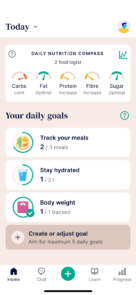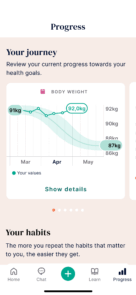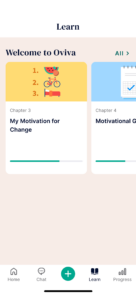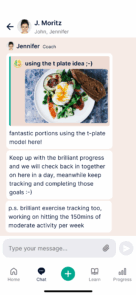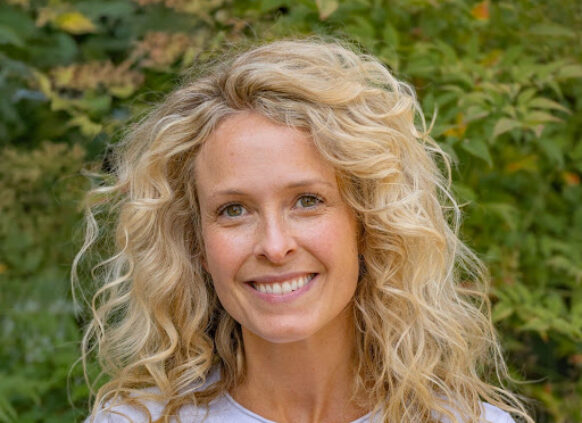
Lucy Diamond
Lucy Diamond is a UK-certified and NHS-registered dietitian. Lucy is also on the Board of Directors at The British Dietetic Association (BDA). As Clinical Director for Innovation at Oviva, Lucy ensures all our pathways and products are not only evidence-based and regularly updated to reflect the latest research.
Get to know Lucy and her journey as a dietitian.
What inspired you to become a dietitian?
Lucy: Originally, I aspired to become a doctor, drawn by the idea of helping people through medicine. However, as I delved deeper into the field, I realised I wanted a career that aligned more closely with my passion for food and physical activity while utilising my background in science and maths.
Nutrition became the perfect blend of my interests, allowing me to contribute to health not just through treatment but through prevention as well. Dietetics offered the ideal combination of a science-based and caring profession, and it quickly became my calling.
The loss of several family members, including my dad, to cardiovascular diseases at a young age had a significant impact on me. Witnessing the challenges they faced made me realise the importance of prevention in healthcare. This experience inspired me to focus on helping people make sustainable lifestyle changes that could reduce the risk of similar outcomes.
As a dietitian, I’m able to support individuals in a proactive approach to their health, empowering them to make informed decisions about their nutrition and overall well-being. Being part of this journey, where small changes can lead to big health improvements, is both meaningful and fulfilling.
As a dietitian, it’s crucial to approach each client with compassion and flexibility, recognising that there is no one-size-fits-all solution.
What certifications have you attained and how do they support your work?
Lucy: I graduated with First-Class Honours in my four-year Dietetics degree. This science-based degree in the UK combines rigorous academic learning with extensive practical placements in clinical and community settings, typically over three to four years. The program equips students with the necessary knowledge and skills to become registered dietitians, capable of working across a variety of healthcare environments, including clinical, public health, and community nutrition.
Upon qualification, I immediately registered with the Health and Care Professions Council (HCPC), officially becoming a registered dietitian and healthcare professional. Additionally, I became a member of the British Dietetic Association (BDA), ensuring continued professional development and alignment with industry standards.
I spent nearly a decade working within the NHS, initially starting as a Band 5 Dietitian, where I developed a broad foundation of clinical experience. I later specialised in diabetes management, advancing to the role of Band 7 Diabetes Specialist Dietitian at a prestigious London hospital. In this role, I honed my expertise in diabetes care, delivering high-quality patient support in a fast-paced, multidisciplinary environment.
Before joining Oviva 9 years ago!
What are the 2-3 key learnings from your career in healthcare and working with patients so far?
Lucy:
The power of personal connection:
Working with people to achieve their health goals has shown me the value of personal connection in dietetic practice. I’ve learned that building trust and understanding individual motivations is essential to helping clients make sustainable lifestyle changes. Whether in a clinical setting or community health, the ability to listen, empathise, and support people through their unique challenges is what drives meaningful progress.
Life is complex and hard:
One of the most important lessons I’ve learned is that life is rarely straightforward, and people face complex, often overwhelming barriers to achieving their health goals.
Challenges like stress, family dynamics, mental health struggles, and socioeconomic factors heavily impact people’s ability to make lifestyle changes. As a dietitian, it’s crucial to approach each client with compassion and flexibility, recognising that there is no one-size-fits-all solution.
The importance of adaptability:
Through my varied roles, I’ve realised that adaptability is critical in healthcare.
Patients’ needs and circumstances change, and so must my approaches to care. Whether adjusting nutrition plans for someone’s changing medical condition or incorporating new scientific evidence into my practice, staying flexible ensures I can provide the most relevant, personalised care.
I believe in empowering individuals to make positive, realistic changes that fit into their lifestyle. Small, achievable adjustments can lead to lasting benefits for both body and mind.
What do you do at Oviva?
Lucy: As the Clinical Director for Innovation at Oviva, I ensure that all our pathways and products are evidence-based clinically sound and regularly updated to reflect the latest research. In an ever-evolving field, it’s crucial that we stay at the forefront of emerging evidence.
I also focus on ensuring that our programmes deliver the best possible outcomes, helping our patients achieve their health goals. This includes continuous monitoring and refining of our services to ensure that they are both effective and patient-centred.
What did you do before Oviva?
Lucy: Before joining Oviva, I spent nearly a decade working in the NHS as a dietitian, where I gained extensive clinical experience in managing patients’ nutritional needs across a variety of healthcare settings. Outside of my work at Oviva, I serve as a Director on the Board of the British Dietetic Association (BDA).
What is your nutritional philosophy and why?
Lucy: What we eat and drink is one of the few aspects of life that we can truly control (although it’s not always easy), and it has a profound impact on our overall health and well-being.
While it’s undeniable that making changes can be challenging—especially with the many barriers we face in daily life—my focus is on helping people recognise what they can do to improve their nutrition and holistic health.
Instead of dwelling on restrictions or what we shouldn’t do, I believe in empowering individuals to make positive, realistic changes that fit into their lifestyle. Small, achievable adjustments can lead to lasting benefits for both body and mind.
What is your favourite feature in the Oviva app?
Lucy: My favourite feature is food logging. It’s a powerful tool for self-regulation, helping users become more mindful of their eating habits. What I love even more now is that we’ve integrated AI-driven instant feedback, which provides personalised insights as soon as users log their meals. This helps them make real-time adjustments and stay on track with their goals.
What would you say to people who believe, after many failed attempts, that they will never achieve weight loss success?
Lucy: I understand how frustrating it can be when you’ve tried repeatedly and nothing seems to work, but it’s important to remember that everybody responds differently to weight loss strategies.
Just because previous attempts haven’t worked doesn’t mean you can’t succeed. It’s likely you just haven’t found the right approach for your body yet.
Weight loss isn’t one-size-fits-all—what works for one person may not work for another, and that’s perfectly normal. The key is to find a method that suits your lifestyle, your body’s unique needs, and to have the right support system in place. With the right guidance and a personalised plan, weight loss success is entirely possible.

